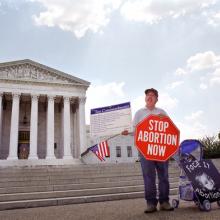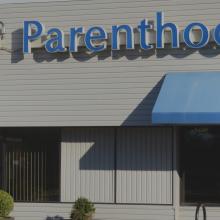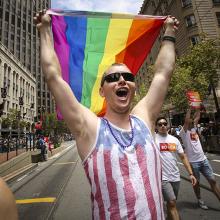Abortion
More than half of churchgoers who have had an abortion (52 percent) say no one at church knows it. Nearly half of women who have had an abortion (49 percent) say pastors’ teachings on forgiveness don’t seem to apply to terminated pregnancies.
“That tells you the environment of the church,” [Scott] McConnell [of LifeWay Reseach] said. “You can’t say you’ve had an abortion, you can’t say you’re considering one — it’s completely taboo to discuss.
“But when a woman is willing to publicly acknowledge she’s had an abortion in the past, she will sometimes be approached by several other women in the church who’ve never been willing to share with anybody that they too have had an abortion. It’s incredibly freeing for them.”

Image via Ryan Rodrick Beiler / Shutterstock / RNS
Nearly a quarter-century after its last major ruling on abortion created a fragile balance between women’s rights and government restrictions, the Supreme Court appears ready for a rematch.
And like the last time, the debate would unfold in the midst of a presidential election.
The first act could play out as early as Nov. 13, when the justices may decide whether to hear a challenge to tough new limits placed on abortion clinics and doctors in Texas. The restrictions — forcing doctors to have admitting privileges at nearby hospitals and requiring clinics to measure up to outpatient surgery centers — threaten to leave the state with just 10 clinics clustered in four population centers and along the Mexican border.

Image via Dabarti CGI / Shutterstock.com
It’s still not quite socially acceptable for women to express the desire to use birth control. To do so is to run the risk of being labeled a ‘slut’ — or worse. Forget all the sexual exploitation and objectification of women that’s all over the Internet and the entertainment industry — what’s really offensive in some quarters is the idea that women desire to have sex without having babies.
For more than 25 years, the federal government has funded abstinence-only sex education programs that have mostly proven ineffective (and even misleading). The United States has a rate of teenage pregnancy that’s significantly higher than other developed countries, and roughly half of all American pregnancies are unplanned.
That figure soars to nearly 70 percent when we’re talking about unmarried women under the age of thirty — and these numbers, too, are significantly higher than those in other developed countries.
By some estimates, 40 percent of unintended pregnancies are ended with an abortion.

Image via Dominick Reuter/Reuters/RNS
House Republicans began their effort to de-fund Planned Parenthood Sept. 9 with the first in a series of hearings intended to make the case that the group is illegally harvesting and selling tissue from aborted fetuses, a claim the group vehemently denies.
The hearing in the House Judiciary Committee — titled “Examining the Horrific Abortion Practices at the Nation’s Largest Abortion Provider” — is the first of several hearings expected this fall as three House committees pursue investigations of Planned Parenthood. House Republicans also launched a website Wednesday to track their investigations into the group.
Beyond the specific techniques under scrutiny, the hearing became an opportunity to air a broader agenda of reducing abortions generally. Chairman Bob Goodlatte, R-Va., opened the hearing with a call for Congress to pass legislation to bar all abortions after five months of gestation, which would “help ensure that the body parts of late-aborted babies cannot be sold because late-term abortions would be generally prohibited.”
Pope Francis on Sept. 1 told priests to forgive repentant women who had had an abortion, specifically during the yearlong jubilee celebration of Catholic faith, which begins in December.
In a letter to the president of the Pontifical Council for the Promotion of the New Evangelization, the pontiff urges priests to express “words of genuine welcome” to repentant women who have undergone abortions, “combined with a reflection that explains the gravity of the sin committed.”
1. Pope Francis Is Making Americans Uncomfortable — Why That’s a Good Thing
According to Gallup, Pope Francis’ favorability ratings have dropped from 76 percent in 2014 to 45 percent in 2015. America magazine writer Kerry Weber explains the pontiff’s recent dips in the U.S. polls.
2. Why Kylie Jenner Gets to Be ‘Just a Kid,’ But Amandla Stenberg Does Not
"America loves to defend those it perceives to be the most vulnerable — i.e. young white girls — at the expense of and detriment to young girls of color. … Though some may say this is just a pointless Instagram beef between children, this mentality of putting white womanhood on a pedestal has violent, real-world ramifications."
3. NASA Finds ‘Earth’s Bigger, Older Cousin’
Wait … what, now? According to NASA, its Kepler spacecraft has identified a planet some 1,400 light-years away — the first "nearly Earth-size planet to be found in a habitable zone of a start similar to our own," according to CNN.
Not too long after being introduced to John 3:16, I was taught Psalm 139:13: “For it was you who formed my inward parts; you knit me together in my mother’s womb.” Now that I was a Christian, it was important I understood that Christians are anti-abortion, that life begins at conception, and that terminating life is nothing short of murder. Throughout college, I carried the cause of the pro-life movement in a symbol tacked on my school bag: a miniature pair of feet, a replica of a 10-week old baby in utero, intricately shaped in sterling silver.
I didn’t think about it. I never HAD to think about it, having never carried an unwanted pregnancy. For me, the pro-life movement was simple, uncomplicated, pretty, and as sanitized as a small silver ornament. That is, until I moved to China, a country well known for its high rate of abortions — including forced abortions, particularly of baby girls.

Living cells, mixed media artwork. Ruslan Kokarev / Shutterstock.com
It’s not often words escape us. But in the aftermath of the now viral recording(s) raising concerns over whether Planned Parenthood seeks profit from aborted fetal tissue — and the crassness with which its representative discusses how to accomplish it without “crushing” the tissue/organs — that’s where we were left: with no words. We confess to being at a complete loss of what to say in the face of humanity’s brokenness.
Beyond the ethical questions of how an organization receives payment for tissue sales or the debates around the potential benefits of the patients’ donations of fetal tissue, the videos are an in-your-face reminder of our culture’s blatant disrespect for life.
That disregard is not unique in our society, of course. Journalism: “If it bleeds, it leads.” Medicine: “There’s nothing more to be done. She’s a vegetable.” Justice system: “He’s gonna fry.” War: “Light ‘em up.” Uncomfortable questions about life and death and ethics are best papered over with emotionless cliché, obviously.
As a society and as individuals, when we fail to recognize the imago dei in others, we trend further away from our uniquely human capacity to empathize and closer to isolated, analytical, and almost robotic assessments of value.

Photo via Susan Montgomery / Shutterstock.com
I won’t pile on Dr. Nucatola. The video seems pretty disastrous for her and for Planned Parenthood.
I will pile on us. Us? Yes, we the people of the United States of America.
We are the ones who have created a society in which we have become utterly dependent on abortion.
We are the ones who choose every year to turn to abortion clinics and drugs to end one out of five healthy pregnancies.
We are the ones who keep having sex outside of committed and marital relationships — and thus risking an unwelcome pregnancy.
We are the ones who keep having sex without using contraceptives, even when they are readily available.
We are the ones who fight over the politics of abortion without doing much to reduce demand for abortion.

The Planned Parenthood logo is pictured outside a clinic in Boston, Massachusetts, on June 27, 2014. Photo via REUTERS / Dominick Reuter / RNS
Lawmakers are calling for investigations into a health care provider that has come under fire by anti-abortion activists for allegedly selling fetal organs for profit.
The anti-abortion group Center for Medical Progress claims that the Planned Parenthood foundation violated the law by selling the fetal tissue to medical researchers.
Planned Parenthood spokesman Eric Ferrero vehemently denied the accusations, saying that the tissue in question was donated to medical research – not sold.
“These outrageous claims are flat-out untrue, but that doesn’t matter to politicians with a longstanding political agenda to ban abortion and defund Planned Parenthood,” Ferrero said.

Svjatogor / Shutterstock
My new friends adhered to the “seamless garment” philosophy, also called the consistent life ethic, one committed to the protection of all human life, whether from war, poverty, racism, capital punishment, euthanasia, or abortion. One of them gave me a button that read “Peace begins in the womb,” and I pinned it to the bottom of the black leather motorcycle jacket I used to wear in those days.

An IUD. Photo via flocu / Shutterstock / RNS
A much-heralded Colorado effort credited with significantly reducing teen pregnancy and abortion rates is searching for new funding after GOP lawmakers declined to provide taxpayer dollars to keep it going.
Started in 2009 with an anonymous private grant, the state-run Colorado Family Planning Initiative gave free or reduced-price IUDs or implantable birth control to more than 30,000 women. During that period, births to teen mothers dropped by 40 percent and abortions dropped 35 percent, the state said. Armed with a national award for excellence, state health officials asked lawmakers this spring to provide $5 million to keep it going but were rebuffed.

A man waves a rainbow flag on Sunday (June 28, 2015) while marching in the San Francisco gay pride parade two days after the Supreme Court’s landmark decision that legalized same-sex marriage throughout the country. Photo via REUTERS / Elijah Nouvelage / RNS
In the wake of the landmark Supreme Court decision legalizing gay marriage, a favorite talking point among social conservatives was that even if they lost a battle, they could still win the war: The ruling in Obergefell v. Hodges was akin to the 1973 Roe v. Wade verdict legalizing abortion, they argued , and opponents would continue to fight, and steadily work their way back to victory .
There are several obstacles to that scenario, however. Here are some of them.
The number of abortions nationwide has declined by about 12 percent in the last 5 years, according to the Associated Press. States with the strongest restrictions to abortion access and states with the least show a similar decline in rates.
"Explanations vary," the Associated Press reports, with one factor being a decline in the teen pregnancy rate. Depending on which side of the abortion debate you lie, you can find advocates who attribute the overall decline in abortions to either better sex education and access to contracepton — or advanced technology and a new generation of women for whom there is "an increased awareness of the humanity of the baby before it is born."
From the AP:
"Abortion-rights advocates attribute it to expanded access to effective contraceptives and a drop in unintended pregnancies. Some foes of abortion say there has been a shift in societal attitudes, with more women choosing to carry their pregnancies to term.
Several of the states that have been most aggressive in passing anti-abortion laws — including Indiana, Missouri, Ohio, and Oklahoma — have seen their abortion numbers drop by more than 15 percent since 2010. But more liberal states such as New York, Washington and Oregon also had declines of that magnitude, even as they maintained unrestricted access to abortion."
Public Religion Research Institute, a public opinion research group in Washington, D.C., has created an interactive atlas of American values and hot-button social issues. See where your state lands on attitudes over the availability and legality of abortion here.
Pope Francis on June 5 met Chilean President Michelle Bachelet, while outside in St. Peter’s Square anti-abortion protesters drew attention to one of the most controversial topics up for discussion between the two leaders.
The meeting centered around “issues of common interest” such as education and “social peace,” as a Vatican statement put it. But the most contentious topic in play was “the protection of human life,” a nod to the traditionally Catholic country’s strict abortion law, which Bachelet is trying to modify.
Earlier this year, the Chilean leader proposed changes to allow abortions in cases of rape or if a woman’s life was in danger.
Despite Americans’ shifting opinions on a range of moral and ethical issues, abortion foes have been encouraged by numbers showing that opposition to abortion rights appeared to have resisted serious slippage, and was even gaining traction.
But a Gallup poll released May 29 shows that may be changing: 50 percent of all Americans now identify as “pro-choice,” the first statistically significant lead over the “pro-life” label, which came in at 44 percent, since 2008.
The data suggest this could signal an end to the seesaw battle that has characterized opinions on abortion over the past few years.
Martin O’Malley, who just wrapped up his second term as Maryland governor, is loudly, proudly Catholic — even when some doctrine-devoted church followers hiss at his socially liberal views.
Here are five faith facts about O’Malley, 52, who is expected to announce his candidacy on May 30.
San Francisco Archbishop Salvatore Cordileone has rejected criticism from state lawmakers over the use of morality clauses for Catholic schoolteachers, asking whether they would “hire a campaign manager who advocates policies contrary to those you stand for?”
The archdiocese sparked protests earlier this month when it unveiled morality clauses for four Catholic high school handbooks as well as for teacher labor contracts.
The handbooks single out church teaching against homosexual relations, same-sex marriage, abortion, artificial birth control and “reproductive technology,” women’s ordination, pornography, masturbation and human cloning, according to the National Catholic Reporter.
The language says that “administrators, faculty, and staff of any faith or no faith are expected to arrange and conduct their lives so as not to visibly contradict, undermine or deny” church doctrine and practice on those topics.
Five members of the state Assembly and three state senators sent Cordileone a letter urging him to remove the clauses, which they said were discriminatory and divisive.
With measles outbreaks in 14 states and health authorities imploring parents to weigh the minimal risks of vaccines against the ravages of preventable disease, some Christians are raising an objection of a completely different sort: the abortion connection.
Abortion?
The Internet rumors that claim vaccinations mean having tiny pieces of aborted fetuses injected into your body are flat-out wrong, yet there is a grain of truth in the assertion that vaccinations and abortions are linked.
Many of the most common vaccines, for rubella and chicken pox for example, are grown in and then removed from cells descended from the cells of aborted fetuses. Pregnant women aborted them about 40 years ago by choice, and not with the intent of aiding vaccine production.
Yet for some religious believers, those facts do not lift what they see as a moral prohibition against vaccination.
Abortion politics are never very far beneath the surface in American life, but every year around the anniversary of the Supreme Court’s landmark Roe v. Wade decision, handed down Jan. 22, 1973, they take center stage.
The annual March for Life on Jan. 22 will draw more than 100,000 demonstrators to Washington. Religious conservatives will march in protest, firm in their belief that abortion should not only be considered a sin, but also a crime.
And religious liberals, though often skeptical about the morality of abortion, will affirm their belief that a decision to end a pregnancy should be left solely to a woman, her doctors, and her conscience.
In the years after Roe v. Wade, most evangelicals came alongside the Roman Catholic Church to oppose legal abortion. Mainline Protestants, at least among denominational elites, strongly advocated for abortion rights, even though mainline clergy are evenly divided on the legality of abortion and do not talk about it much.
But while conservative religious activists at the March for Life and progressive religious leaders supporting the Religious Coalition for Reproductive Choice do speak for a subset of the people they purport to represent, the absolutism of polarized activist elites betrays the more ambivalent views of rank-and-file Americans.









